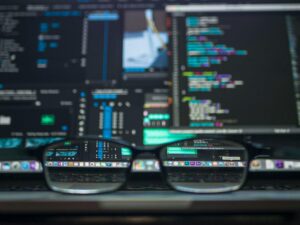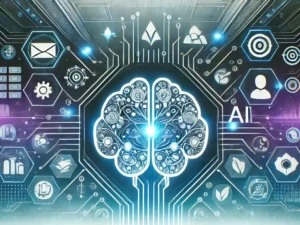The Future of AI in Software Development: Shaping a New Era of Innovation
As we step into a future where artificial intelligence (AI) plays an increasingly prominent role, software development is undergoing a transformative shift. The integration of AI into software development processes is not only reshaping how we build applications but is also expanding the boundaries of what’s possible in the tech world. From automating routine tasks to enhancing decision-making, AI is becoming a powerful ally for developers, empowering them to create more robust, efficient, and intelligent software.
In this blog, we’ll explore the impact of AI on the future of software development, highlighting the opportunities, challenges, and exciting possibilities that lie ahead.
1. Automated Code Generation and Development Speed
One of the most immediate impacts of AI in software development is in automated code generation. AI-powered tools like GitHub Copilot and OpenAI’s Codex can analyze natural language inputs to generate code snippets, reducing the time developers spend on writing repetitive code. As these tools improve, developers can focus on complex problem-solving and creative aspects of development rather than repetitive, time-consuming tasks.
In the future, AI could even take over more significant portions of the coding process, from building entire modules to suggesting optimizations in real time. This will lead to faster project turnarounds, allowing businesses to bring products to market more quickly and respond to customer demands at unprecedented speeds.
2. Enhanced Software Testing and Quality Assurance
Software testing is an essential but often labor-intensive process. Traditionally, it requires manual effort and a keen eye to catch every potential bug. However, AI-powered testing tools are changing this. With the ability to automatically generate test cases, predict potential issues, and even conduct intelligent debugging, AI is streamlining software testing like never before.
In the future, AI-driven testing could lead to self-healing code, where applications can detect and fix errors on their own. This would significantly reduce downtime and make software products more reliable, delivering a better user experience. Continuous testing, a critical part of DevOps, will also become faster and more accurate, enhancing software quality and reducing costs associated with post-release bug fixes.
3. AI-Driven Predictive Analytics and Decision-Making
Data-driven insights are crucial in software development, helping teams make informed decisions about user requirements, feature prioritization, and system performance. AI and machine learning can analyze vast amounts of data to provide predictive insights, forecasting user behavior, potential system failures, and even market trends.
With these insights, developers and business leaders can make proactive decisions, staying ahead of user demands and optimizing resources. AI’s predictive capabilities are expected to play an even more significant role in the future, aiding in areas like resource allocation, workload management, and even strategic project planning.


Our team’s dedication to excellence is evident in our projects, and we’re constantly looking to innovate and improve. Whether you need a web app, a mobile solution, or a complete digital transformation, we have the expertise and commitment to bring your vision to life.
4. Natural Language Processing (NLP) for Improved User Interfaces
As AI-powered NLP continues to advance, the future will see more conversational user interfaces. Chatbots and voice-activated assistants are becoming more sophisticated, allowing users to interact with software in a more natural, human-like manner. NLP-driven applications can understand and respond to complex queries, providing a seamless and intuitive user experience.
This shift will influence software development by prompting developers to prioritize NLP integration, ensuring that applications can understand and process human language. AI-powered interfaces will likely become the norm, transforming how users interact with software, making technology more accessible and user-friendly.
5. Personalized User Experiences with AI
AI is enabling software developers to create highly personalized experiences for users. By analyzing user data, AI can tailor content, features, and interactions to suit individual preferences, leading to more engaging and enjoyable experiences. Think of personalized recommendations on streaming platforms or tailored shopping suggestions on e-commerce websites – these are just the beginning.
In the future, AI-driven personalization will go beyond recommendations. Software will adapt in real time to users’ behaviors, adjusting its interface, functionalities, and even complexity levels to meet individual needs. This could lead to “self-optimizing” applications that evolve with each user, making software feel like a unique, customized tool for everyone.
6. The Rise of AI-Augmented Development Environments
Integrated development environments (IDEs) and code editors are also evolving with AI enhancements. Future development environments will come with built-in AI capabilities that can assist with debugging, refactoring, and even architecture planning. These AI-augmented IDEs will help developers catch errors as they code, suggest best practices, and even warn them about potential security vulnerabilities.
With the rise of these intelligent tools, developers will have access to a virtual assistant that understands the context of their project, guides them through challenges, and offers solutions in real time. This augmented support will reduce errors, boost productivity, and lead to cleaner, more secure codebases.
7. Ethical AI and Responsible Development
With great power comes great responsibility. As AI becomes more ingrained in software development, ethical considerations are gaining importance. Developers will need to consider issues like bias, data privacy, and transparency. AI systems can sometimes produce unintended consequences due to biased training data or a lack of transparency, leading to ethical and social challenges.
The future of AI in software development will likely see the rise of “ethical AI” guidelines, pushing developers to adopt responsible practices. This may include techniques like fairness-aware machine learning, explainable AI, and transparency tools that give users insight into how AI decisions are made. Software development teams will need to prioritize ethics and actively work to mitigate bias, ensuring AI’s positive impact on society.
8. The Evolution of the Developer’s Role
As AI continues to automate and assist in various aspects of software development, the role of the developer will evolve. While AI can handle repetitive tasks and even some problem-solving, developers will need to focus more on strategic thinking, creative solutions, and ethical considerations. AI won’t replace developers, but it will change the way they work, pushing them to develop new skills in AI integration, data analysis, and ethical programming.
Developers will become more like “AI curators” or “machine mentors,” where they design, guide, and oversee AI systems rather than coding everything from scratch. This shift will open up new avenues for growth, enabling developers to work on more high-level and impactful projects.
Embracing the Future
The future of AI in software development holds enormous potential. It’s a future where developers and machines collaborate to build smarter, faster, and more personalized applications. While there are challenges to address, especially in terms of ethics and bias, the opportunities are too significant to ignore.
At Forrentech, we’re excited about the ways AI is transforming our industry. We’re committed to harnessing these advancements to deliver powerful, future-ready solutions to our clients. As we continue to innovate, we remain focused on leveraging AI to not only improve our products but also to empower our team, enhance productivity, and drive meaningful impact in the tech world.
Are you ready to take the leap into the future of AI-powered software development? Join us on this journey, and let’s build the next generation of intelligent software together.
